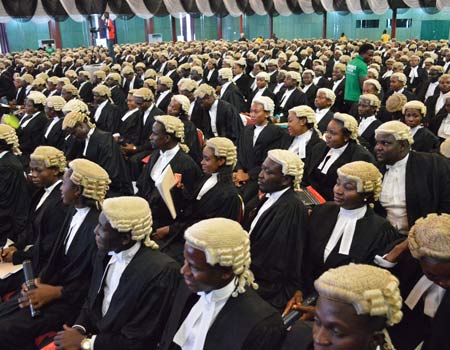Efforts to maintain the standard of legal education remains paramount among stakeholders despite increasing number of unaccredited schools and fake lawyers in the field.
The recent statement by the Nigerian Law School (NLS) rejecting students from unaccredited higher institutions shows that the problem of lowering standards and quackery in both legal studies and profession has refused to go away.
- Stop running to Buhari over insecurity, Senate tells govs
- Nigeria, Belgium to sign Bilateral Educational Agreement
In the January 2020 Call to Bar results, five candidates made First Class, 77 made Second Class Upper and 633 in Second Class Lower, out of 1,864 candidates of the Nigerian Law School.
In the 2019 results, out of 5,689 candidates who sat for the examination, 147 got First Class, 741 bagged Second-Class Upper Grade, while 2, 246 made Second Class Lower.
The Nigerian Law School has six campuses, and the Council of Legal Education (CLE), the Body of Benchers as the statutory institutions for the training and regulation of professional legal education in the country. The accreditation of Law faculties and other academic institutions, however rests with the National Universities Commission (NUC).
In furtherance of these functions, these institutions have scrapped the several evening Law studies and distance learning programmes, which were offered in many unrecognized locations in Nigeria as a means of quality control. Despite this, many unaccredited institutions have continued to offer law courses.
The problems of proliferation of unaccredited law programmes in the country and the level of unemployment in Nigeria, could be linked to those of standards and illegal practitioners.
For example, the Nigerian Law School in January rejected law graduates from Houdegbe North American University, Cotonou, Benin Republic for not being accredited by the NUC.
According to a statement from the Secretary of the Council of Legal Education, Mrs Elizabeth Max-Uba on January 15, part of the reason for the ban is that the university is domiciled in Civil Law jurisdiction yet its law faculty was offering Common Law course only, and the subjects of the programme were specifically designated Nigerian.
The Law School said the ban, imposed in 2015, and appealed against on November 25, 2020, was reinstated to maintain standard.
The council also noted that the students of the school were 100% Nigerians and the language of instruction was English, whereas French is the lingua franca of Benin Republic, adding that “the lecturers were Nigerians drawn from faculties of law in the South West region of Nigeria, who were teaching there on part-time basis.”
“Information gathered from independent sources indicated that the university had no approval from the regulatory authority in that country to run a law programme until 2016, after the decision was taken by the Council to suspend admission of its graduates to the Nigerian Law School,” the statement read.
“There are continuing concerns over substandard tertiary institutions in the West African sub-region, Benin Republic in particular, that target Nigerian students for commercial or monetary gains only.
The Director General of the Nigerian Law School, Prof. Isa Hayatu Chiroma, did not respond to calls to his number on measures to ensure the standard of legal education is maintained. But Section A of the Regulation for Admissions and Training at the Nigerian Law School explains why and how the school emphasizes the quality of law faculties offering the course in universities.
“A Law degree of an approved university. For the purpose of such approval, the Council will have regard to the contents of the course leading to the degree with a view to ensuring that the subjects taken and the depth covered are such that will provide the maximum basic knowledge of the law as is required, to enable a student derive maximum benefit from the Nigerian Law School course; and ultimately set up legal practice in Nigeria.
“Where a university is outside Nigeria, the accreditation of the university to the National Legal Professional Association in the country concerned will be considered. Only universities in common law countries are approved. Only degrees awarded by a university to its internal students are recognized.”
“Any candidate who is deficient in any core subject will be referred to any of the recognized universities to remedy the deficiency.”
Responding, spokesman of the Nigerian Bar Association (NBA), Dr Ralph Nduka-Rapu, said unless the authorities insist on doing the right thing, the legal profession in Nigeria in the next five to 10 years will be endangered.
“But we keep on praying and demanding that those in charge of these areas keep on insisting on the right things to be done because I tell you, if you open the floodgates, we would be overrun by a lot of nonsense going on at the moment. Even what we have on ground right now is not the best,” he said.
“The insistence of the Council of Legal Education and the NUC has also helped in stemming that tide of persons who do not have quality legal education. For example, I also read that the Council gave those who went to the Open University some waivers and a lot of stringent conditions before they can go through.
He noted that the Law School, being the climax of legal education, is mandatory for all those who wish to practice law, adding that attending institutions that are not accredited by the NUC and CLE would deny the individual the opportunity.
On quackery in the legal profession, Rapu said the stamp and seal has helped a lot to eradicate the phenomena.
Speaking on the enforcement of legal standards, the chairman of the Council of Legal Education, Emeka Ngige, said the greater responsibility to ensure universities live up to the required standards is with the NUC.
“The council cannot just jump into a university and stop faculty from going on, but when the candidates come to us, we will stop them if they are not accredited,” he said.
Abuja-based lawyer and public affairs analyst, Darlington Ozurumba faulted the suggestion that the quality of legal education in Nigeria has fallen.
“In those days, it used to be difficult for the Law School to produce more than five First Class candidates or even get 2.1. But nowadays, they are producing more than 10 or 15 First Class graduates. That means, there is an improvement,” he said.
He blamed incidents of quackery to those who failed or had conditional pass from the Law School and rather than remedy their flaws, hanged out in Abuja ‘practicing’.

 Join Daily Trust WhatsApp Community For Quick Access To News and Happenings Around You.
Join Daily Trust WhatsApp Community For Quick Access To News and Happenings Around You.


